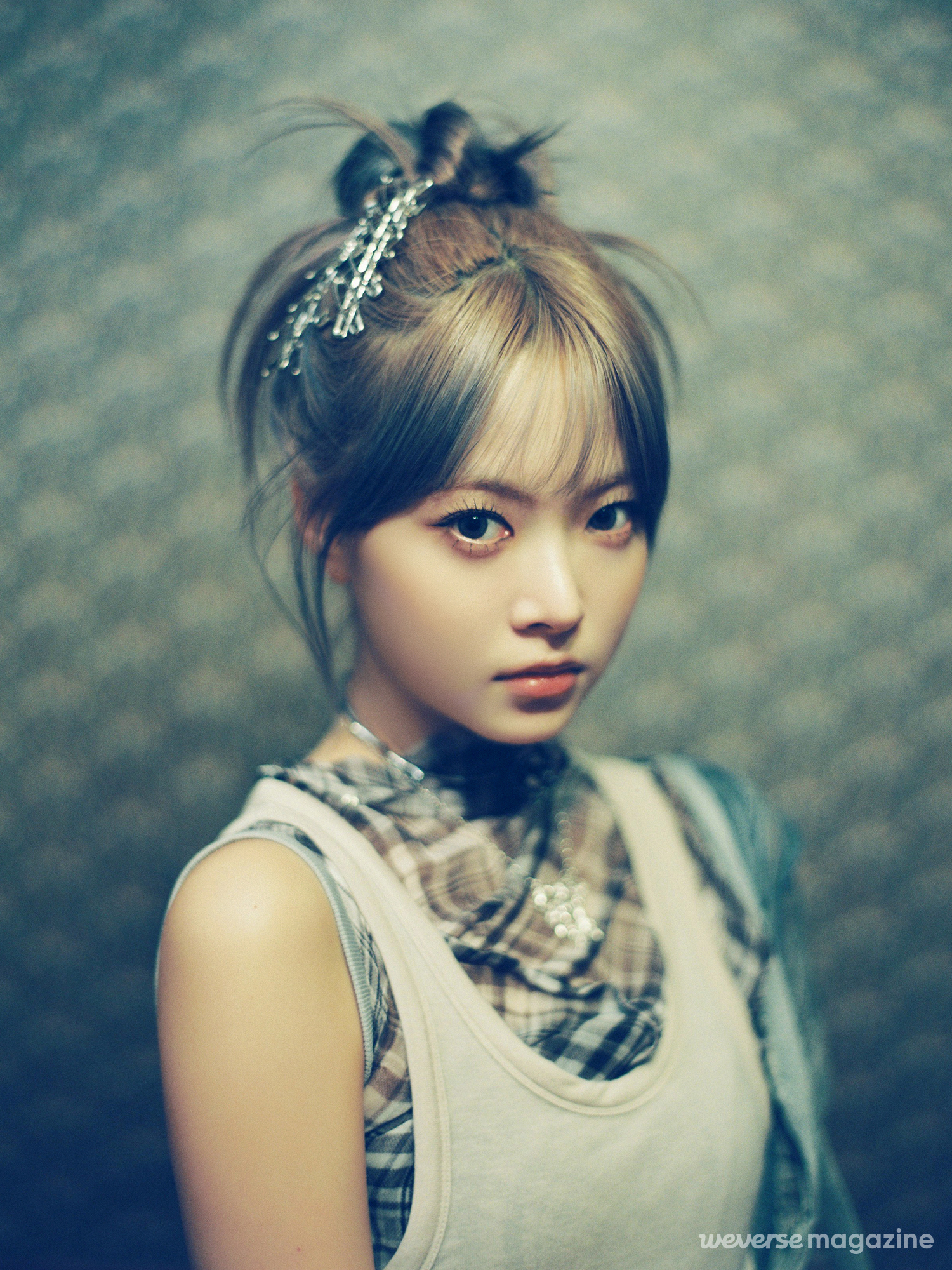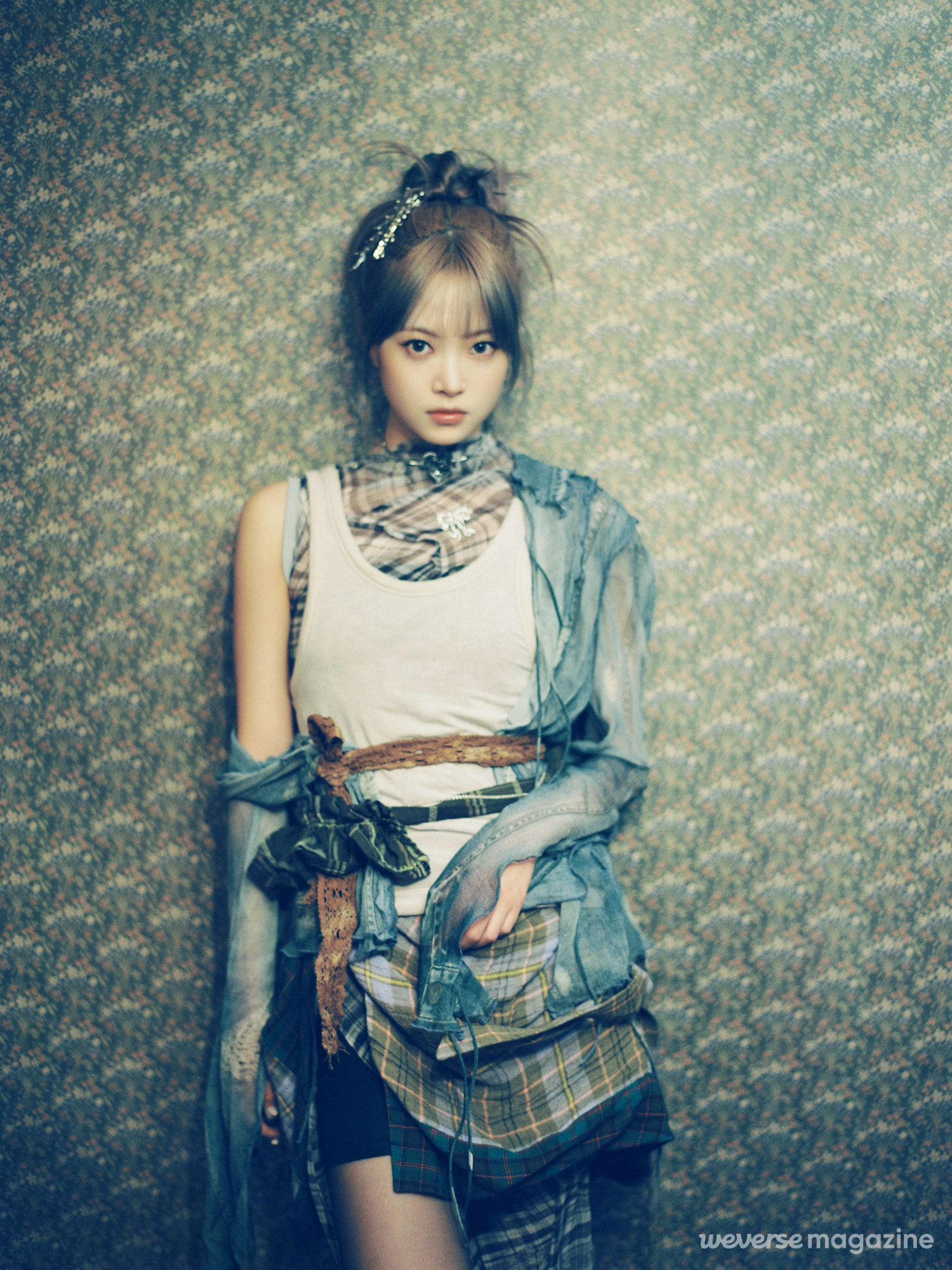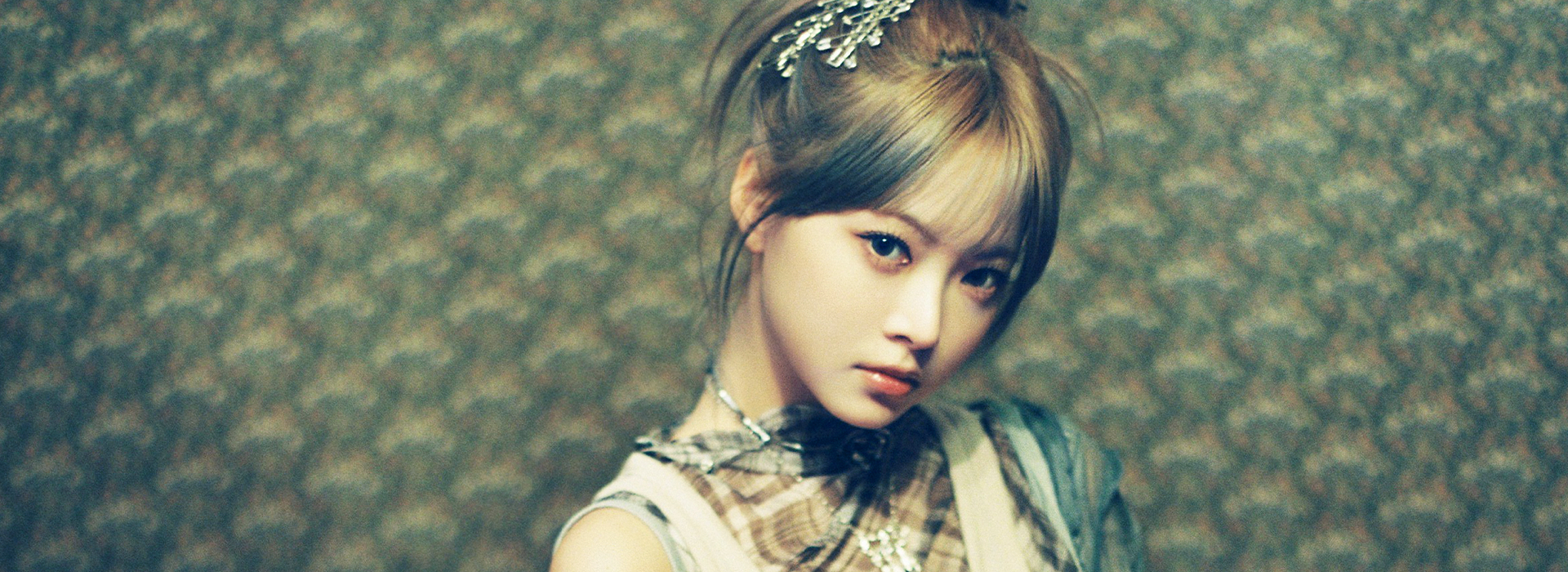
At this particular moment in her life, she says, HONG EUNCHAE is a “question mark.” With every new challenge she faces, she writes out each day of her life—punctuated by the occasional comma and the occasional exclamation mark—all the while sensing the changes in certain paragraphs of her life, creating space for herself to breathe, and finding the strength to take on the world time and time again.
-
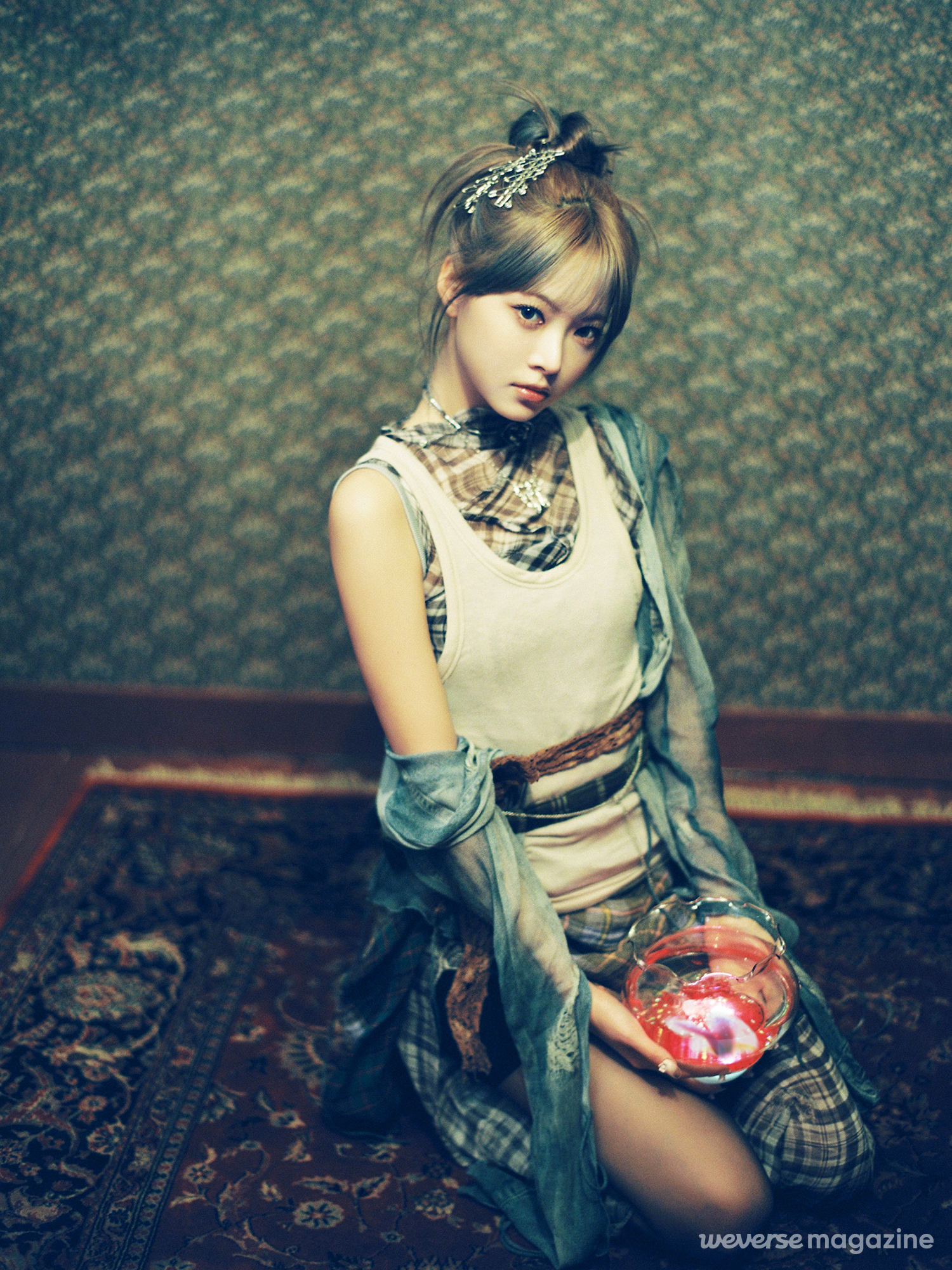 Silver ribbon necklace by MOIRAxMEL; chain belt by G.V.G.V.; upcycled lace belt and upcycled checkered belt by Newsian; stockings and boots from the stylist’s personal collection; custom necklace and hair clips by Tomoya Nakagawa.
Silver ribbon necklace by MOIRAxMEL; chain belt by G.V.G.V.; upcycled lace belt and upcycled checkered belt by Newsian; stockings and boots from the stylist’s personal collection; custom necklace and hair clips by Tomoya Nakagawa.
You did a solo performance for the opening of the MAMA Awards last year.
HONG EUNCHAE: The Tokyo Dome is huge, and with so many other artists watching, I was really determined to do well. I usually get over my nerves quickly after getting on stage and immerse myself in the performance, but there were so many intricate parts for that performance that I felt more nervous than usual. There was fire, ripping clothes, jumping over a table, falling backwards, making sure not to step on my skirt and throwing it away … There was so much going on that I felt like I was dancing using my brain. But then it was over as quickly as it started. Phew … now I hardly remember a thing about it. (laughs) There was also so much fog during that performance that the paper wouldn’t set on fire properly. I came down from the stage all upset, feeling like the whole thing was ruined, but then the other members came running up to me. I don’t know whether to call it reassurance or happiness, but it was such a new, weird feeling to me that I can’t even put it into words.
The theme of the opening performance was “I AM SPECIAL,” and the message really resonated with a lot of people. As you said in the voice-over, “I thought I was nothing special. I was actually a very special person.”
HONG EUNCHAE: It’s exactly like I said: I didn’t think I was anything special. Everyone in the group has their own story, right? One of us got into K-pop after 15 years of ballet, another debuted three times, another two times, and another went back to the US after training only to return again. Our group sings about these stories of ours, but in my case, I was just going to school before I auditioned and debuted, so I always struggled with what to say whenever I had to write lyrics for a song. That performance gave me an opportunity to express, through voice-over and through dance, exactly that struggle, and for that I felt grateful and liberated.
It sounds like you’ve struggled continuously with what you sing about in “Swan Song”: “So many days, so many nights, so many tears / Sometimes I’m anxious.”
HONG EUNCHAE: When I first debuted with LE SSERAFIM, a lot of people told me, “You’re so lucky.” I wasn’t exactly sure myself why I was able to be a part of the group. That’s why the part you brought up felt like it was specifically about me. It’s always been more important to me to prove to myself why I was given such a good opportunity than to the people who tell me I’m lucky.
In the TVING documentary series K-Pop Generation from last March, you were discussing the opinion that your debut came down to luck, and SAKURA said, “We’re all lucky. If we weren’t, we wouldn’t be here. Luck is its own kind of skill.”
HONG EUNCHAE: I used to tell myself I was really lucky and I’d better work hard until the day I die, but it’s different now: I guess if I keep working really hard, opportunities eventually find their way to me. I was presented with an opportunity because I was prepared, and being able to seize on it must’ve come down to skill, too. I became better aware of why I was given that kind of opportunity back then after being in this position for a while, which took the pressure off somewhat, but it came with its own set of concerns.
Like what?
HONG EUNCHAE: How can I make more people like me? What am I good at and passionate about? Practical concerns like that. I guess they’re constant concerns that I’ll have to carry with me throughout my entire entertainment career. Sometimes, though, I’ll be hit with thoughts like, What am I working so hard towards? What do I want to do next? Honestly, it can be really challenging, and there are times when I can’t come up with any immediate reason why I keep at this career. When that happens, I tell myself, Just do it. Everything I’m doing now will help me later on. I can’t say I’m totally confident that the direction I’m currently heading in is the right one. That may be, but I’ll just keep on going. You have to keep going to find out whether it’s right for you or not.
If that’s the case, there must be times when you feel depleted of energy. How do you recharge your batteries then?
HONG EUNCHAE: By receiving recognition, like the Digital Content and Best Couple awards at the KBS Entertainment Awards. I don’t mean to obsess over accolades (laughs) but when it’s right there in front of my eyes, it motivates me to work harder and gives me a sense of fulfillment. Doing everything I love and winning awards for it reminds me why I put in so much effort.
So it’s that sense of accomplishment that motivates you. It’s already been a year since you became a host on Music Bank on KBS.
HONG EUNCHAE: It’s still awkward and difficult for me when interviewing someone to transition smoothly into conversation after asking a question. But, people know how to adapt, as they say (laughs) and I feel like I’ve improved a lot thanks to asking a lot of questions and hearing all different responses. Back when I was in school, I enjoyed speaking in front of others, but I didn’t have such opportunities once I became a trainee. Being a host has felt like rediscovering something I used to enjoy. And since it’s a position every idol dreams of having, I’m really grateful for it. I’m having a lot of fun with it.
When RYUJIN appeared on EUNCHAE’s Star Diary, she said she admires you because you’re “so busy and I’m sure it’s hard for her, but she’s always smiling when I see her.”
HONG EUNCHAE: I’m normally pretty shy and quiet, and I don’t really laugh that much. I used to be really outgoing, but once I started training, I couldn’t talk with my friends as much, and my personality changed once I tried to conserve my energy when I wasn’t practicing, and I’m still like that now. It’s surprising—I don’t go out of my way to try and come off a certain way, but people often say I have a lot of positive energy, and I wonder if that’s just a part of who I am or if it naturally happens when I’m working.
Maybe it’s something that happens when you’re trying to find yourself in certain situations, like working. SAKURA mentioned during a Weverse Live that you seem “to have become more realistic” lately.
HONG EUNCHAE: If I had to choose between being or working with someone who’s really good at their job but doesn’t have a great personality, and someone who’s really, really nice and hardworking but bad at their job, I’d still choose the former. To put it in MBTI terms, I’m an F when it comes to other people but a total T when it comes to work. I used to be the type to avoid things—I couldn’t stand doing anything challenging and procrastinated—but lately I just accept things for what they are and dive headfirst into challenges. I like it better that way.
In the 2024 SEASON’S GREETINGS making-of video, you describe yourself succinctly as a “question mark.”
HONG EUNCHAE: It feels like I’m busy trying to figure myself out 365 days a year. I honestly don’t really know myself well. Other people tell me I seem like this kind or that kind of person, but I can’t see it in myself. I always wonder about what kind of personality I have, what I really like to do, and what makes me happy.
-
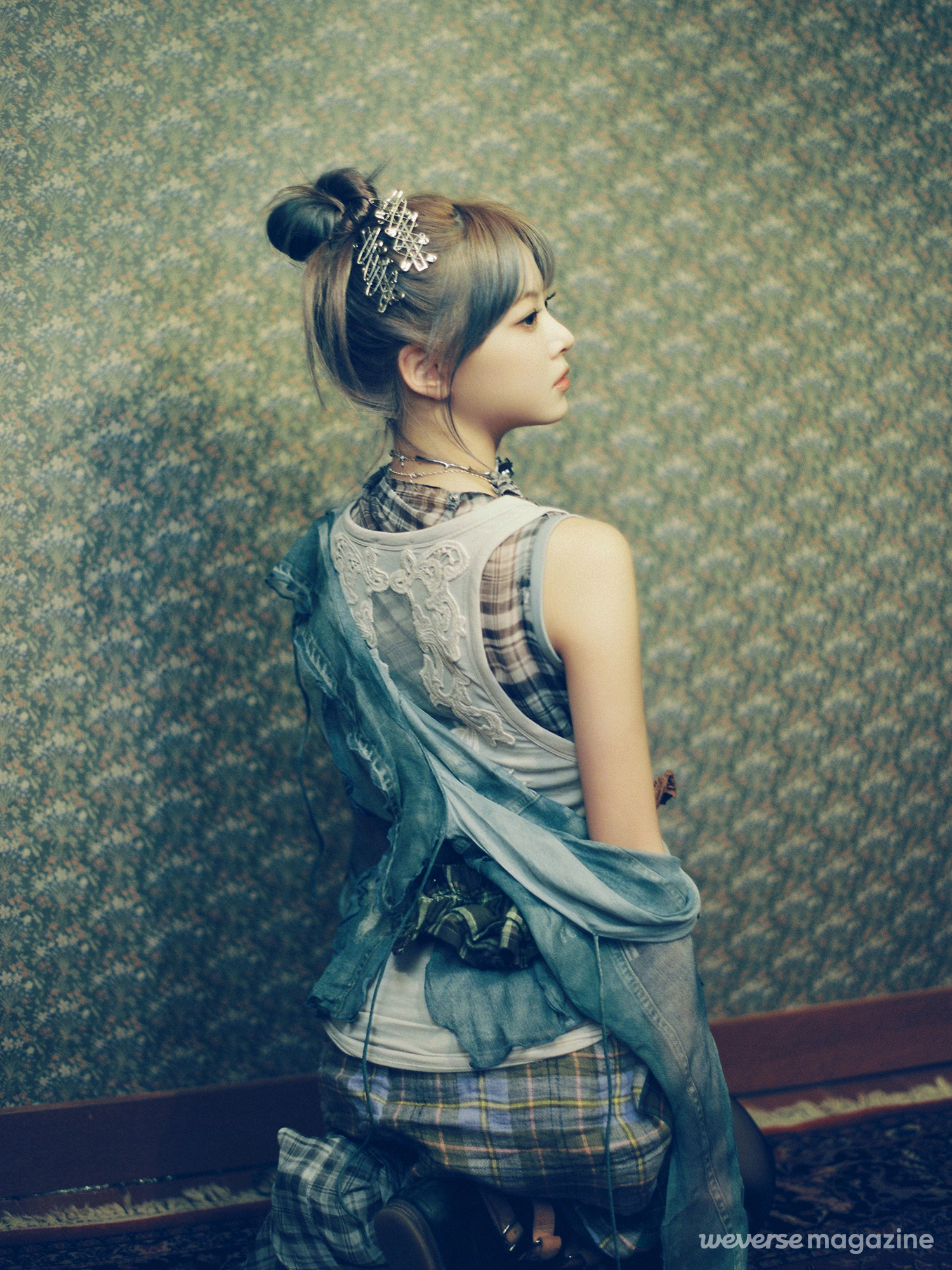 Checkered long dress and printed denim shirt by Acne Studios; tank top by kollide; checkered skirt by Andreas Kronthaler for Vivienne Westwood.
Checkered long dress and printed denim shirt by Acne Studios; tank top by kollide; checkered skirt by Andreas Kronthaler for Vivienne Westwood.
Nothing’s ever easy, is it?
HONG EUNCHAE: I mean, we’re under HYBE and working in a good environment with great staff, so it feels like we really need to succeed, which can be overwhelming at times. People only see the finished product, so I feel like I might feel guilty if the end result isn’t good enough. It can be overwhelming trying to make a follow-up. That’s why I feel so confident about the message in EASY and why I love it so much—because it’s something I’ve always wanted to talk about. I think there’s been quite a few times where the reception didn’t quite live up to all our hard work. It can be sad and frustrating, but recently I’ve been telling myself it would be even more astounding if we succeed later on. It’s no fun being perfect right out the gate! I’ve basically been brainwashing myself that way. (laughs)
That feels like the same kind of cool attitude the song “EASY” is filled with.
HONG EUNCHAE: It was hard to act relaxed and look really fun under such physically demanding circumstances. I was fairly concerned about the vocals because it wasn’t high-pitched or belted out; it was more like rapping, and that was a first for me. I received a lot of direction this time to sing like an ice queen. (laughs) It’s so different from my real personality so it felt really awkward. I worked really hard to sound as nonchalant as possible, and I hope the change in the style of dance and vocals comes across well.
How was the style of dance different?
HONG EUNCHAE: It’s okay to look like you’re really exerting yourself when it’s supposed to look like a high-intensity performance, but for this one, it wasn’t supposed to be like that. It’s not the kind of dance where we can get by just keeping in sync or knowing exactly where to pick up the energy. It was okay working in the genre itself since I took more hip hop classes as a trainee than anything else, but to look relaxed and pump the brakes slightly proved to be really challenging in practice. People have told me my dancing is really clean-cut ever since I was a trainee, and while that’s one of my strengths, it can also be a weakness.
It’s definitely to your advantage when you do all those dance challenges as the host of Music Bank. Your performance of “Smoke” (prod. Dynamicduo, Padi) on The Seasons: Long Day, Long Night with AKMU was particularly striking.
HONG EUNCHAE: I was scared right from the minute I chose that song. That was the first time I ever felt nervous taking on a challenge. It only looks cool if done right, and with barely a day to practice due to time constraints, I was really worried, but fortunately it got a decent reaction. (laughs) I usually pick up choreography for the sake of dance challenges, or sometimes I’ll purposely look them up when a guest’s coming on Star Diary. They’re all interesting in their own ways. I have a natural interest in choreo, so I pick up the highlights subconsciously.
-
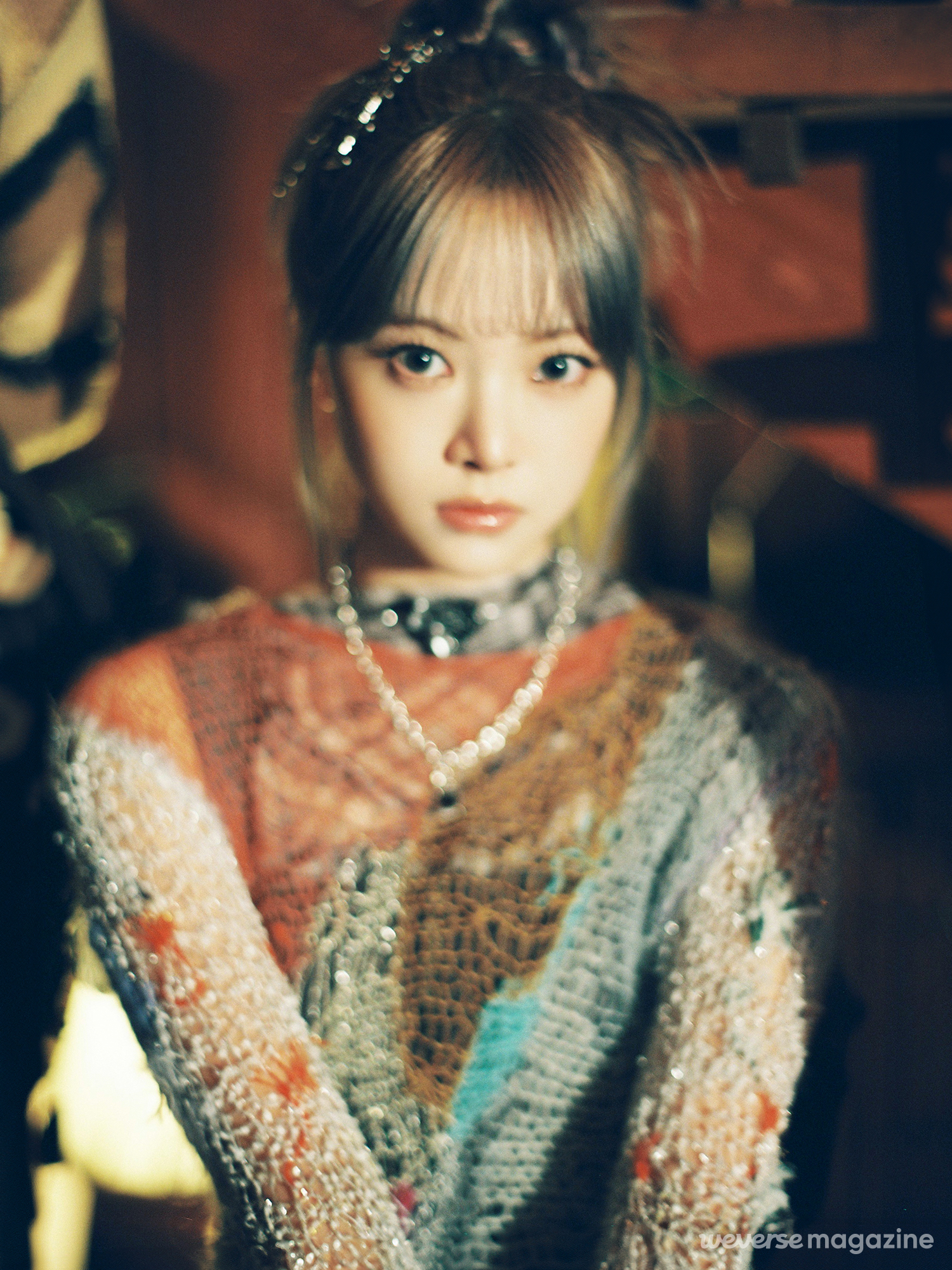 Snowdon knit sweater, Acne Studios checkered long dress; HYEIN SEO gray inner top; Andreas Kronthaler for Vivienne Westwood checkered skirt; Newsian upcycled checkered belt; ISHI stone necklace; Tomoya Nakagawa custom hair clips.
Snowdon knit sweater, Acne Studios checkered long dress; HYEIN SEO gray inner top; Andreas Kronthaler for Vivienne Westwood checkered skirt; Newsian upcycled checkered belt; ISHI stone necklace; Tomoya Nakagawa custom hair clips.
I remember on January 1 you wrote on Weverse that “it’s exciting to have a fresh start, but I’ll make sure to stay responsible” and keep working hard.
HONG EUNCHAE: When you’re an idol, you’re always on display. With so many new people finding out about me this year, I felt I needed to keep up the good work and be a good person. Sometimes I just naturally take responsibility in things, but most of the time, I have to tell myself to do it. I instruct myself: Be responsible! (laughs)
That reminds me of a line from “We got so much”: “We won’t take it for granted.”
HONG EUNCHAE: I used to feel upset if there was even one person who didn’t seem to care about me (laughs) but now I’ve learned that it’s impossible for everyone to like me. The group and the fans are technically separate, right? And yet, the fact that we can work together with love is extraordinary. So there’s always a part of me that feels like it’s important to return this love somehow. It seems I’ve managed to let go of the weight of wanting to be loved by everyone a little bit.
It makes me think of what you said during last year’s holiday Weverse Live about your hopes for 2024: “I can’t imagine it. I just accept everything that goes by. I’m going to enjoy it like that.”
HONG EUNCHAE: If I’m destined to do something, I’ll do it no matter what it is, and if I’m not destined to, then I can’t. That’s why I said I’ll just accept everything as it goes by—because I believe every tiny little thing comes down to fate. For example, if I want chocolate cake and go to a cafe but they’re sold out, I think to myself, Oh well, I guess it wasn’t my destiny to have it today. (laughs) But when it comes to major things, I don’t think it’s a matter of fate! Debuting, being chosen, having the things I wished desperately to happen, happen—I believe all of that really comes down to effort.
It would feel unfair to attribute all your hard-earned achievements to fate, right?
HONG EUNCHAE: Yeah, so I don’t believe that. (laughs)



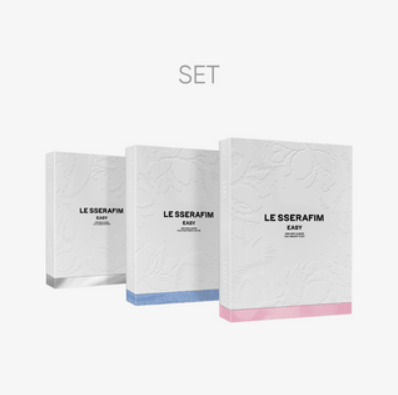
Unauthorized reproduction and distribution prohibited.
